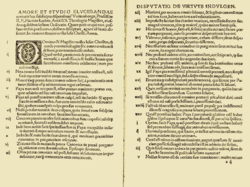Протестантские реформаторы
| Часть серии о |
| Реформация |
|---|
 |
| протестантизм |
| Часть серии о |
| протестантизм |
|---|
 |
Протестантскими реформаторами были богословы, чья карьера, работа и действия привели к протестантской Реформации 16 века.
В контексте Реформации Мартин Лютер был первым реформатором, публично поделившимся своими взглядами в 1517 году, за ним последовали Андреас Карлштадт и Филипп Меланхтон в Виттенберге , которые сразу же присоединились к новому движению. В 1519 году Хулдрих Цвингли стал первым реформатором, выразившим форму реформатской традиции .
Перечислены только наиболее влиятельные реформаторы. Они перечислены по направлениям, хотя некоторые реформаторы оказали влияние на несколько движений и включены в каждый соответствующий раздел.
Известные предшественники
[ редактировать ], на протяжении всего средневековья По словам Эдмунда Хамера Бродбента существовал ряд христианских движений , которые стремились вернуться к тому, что они воспринимали как чистоту апостольской церкви , и чьи учения предвещали протестантские идеи. [1]
- Клавдий Туринский [2]
- Готшалк из Орбаиса [3] [4] [5]
- Беренгар Турский [6] [7] [8]
- Питер Уолдо [9]
- Лоренцо Валла [10]
- Вессель Гансфорт [11]
- Джироламо Савонарола [12]
- Жак Лефевр д'Этапль [13]
- Джон Уиклиф [14]
- Джон Хаус [15]
Арбитражные реформаторы
[ редактировать ]
был ряд ключевых реформаторов В рамках Арбитражной реформации , в том числе:
лютеранин
[ редактировать ]- Мартин Лютер
- Филипп Меланхтон
- Юстус Йонас
- Мартин Хемниц
- Джордж Спалатин
- Йоахим Вестфаль
- Андреас Осиандер
- Йоханнес Бренц
- Йоханнес Бугенхаген
- Андреас Карлштадт , позже радикальный реформатор
- Ганс Таузен
- Микаэль Агрикола
- Примож Трубар
- Иржи Тржановский
реформатский
[ редактировать ]- Хульдрих Цвингли
- Мартин Бусер
- Джон Кальвин
- Генрих Буллингер
- Теодор Беза
- Уильям Фарел
- Джон Нокс
- Wolfgang Capito
- Johannes Oecolampadius
- Peter Martyr Vermigli
- Leo Jud
Anglican
[edit]Arminian
[edit]Radical Reformers
[edit]Important reformers of the Radical Reformation included:
Anabaptist
[edit]Schwenkfelder
[edit]Unitarian
[edit]Second Front Reformers
[edit]There were also a number of people who initially cooperated with the Radical Reformers, but separated from them to form a "Second Front", principally in objection to sacralism. Among these were:
Anabaptist
[edit]Counter Reformers
[edit]Roman Catholics who worked against Protestantism in Counter-Reformation include:
Roman Catholic
[edit]- Girolamo Aleandro
- Augustine Alveld
- Thomas Cajetan
- Johann Cochlaeus
- Johann Eck
- Jerome Emser
- Pope Leo X
- John Tetzel
- Thomas More
- Ignatius Loyola
- Francis de Sales
- Pope Paul III
- Pope Pius V
- Charles Borromeo
- Francis Xavier
- Peter Faber
- Diego Laynez
See also
[edit]- List of Protestant Reformers (alphabetical)
- Protestantism in Germany
References
[edit]- ^ Broadbent, E.H. (1931). The Pilgrim Church. Basingstoke: Pickering & Inglis. ISBN 0720806771.
- ^ F. L. Cross; E. A. Livingstone, eds. (13 March 1997). The Oxford Dictionary of the Christian Church, 3rd edition. USA: Oxford University Press. pp. 359. ISBN 0-19-211655-X.
- ^ "Gottschalk Of Orbais | Roman Catholic theologian". Britannica.com. Retrieved 2021-10-27.
- ^ caryslmbrown (2017-07-18). "Reformation parallels: the case of Gottschalk of Orbais". Doing History in Public. Retrieved 2021-10-27.
- ^ Lockridge, Kenneth R. "Gottschalk "Fulgentius" of Orbais".
- ^ Minton, Gretchen E. (2014-01-26). John Bale's 'The Image of Both Churches'. Springer Science & Business Media. ISBN 978-94-007-7296-0.
Berengar of Tours was an 11th-century theologian who argued that the doctrine of transubstantiation was contrary to reason and unsupported by scripture
- ^ Siebeck, Mohr (11 March 2016). Prophecy, Piety, and the Problem of Historicity: Interpreting the Hebrew. Germany. p. 372. ISBN 978-3-16-154270-1.
Berengar of Tours (c. 1005-1088), Bernand of Clairvaux, the Waldensians in the twelfth century, the Albigensians in the thirteenth century and John Wycliffe (x. 1330-1385) and Jan Hus (c. 1370-1415) in the fourteenth and fifteenth centuries, are all prefigured in the poetic images of Solomon's Songs. They all become forerunners of Luther and Calvin
{{cite book}}: CS1 maint: location missing publisher (link) - ^ Jung, Emma; Franz, Marie-Luise von (1998). The Grail Legend. Princeton University Press. ISBN 978-0-691-00237-8.
Berengar of Tours (first half og the eleventh century), whose views occasioned the dispute known as the Second Eucharistic Controversy. Berengar aught that the body and the blood of the Lord were no "real" in the Eucharist but a specific image or likeleness ("figuram quandam similitudinem"). He was thus a forerunner of the Reformers.
- ^ "Pierre Valdo (1140-1217) and the Waldenses". Musée protestant. Retrieved 2021-12-31.
- ^ "Philip Schaff: History of the Christian Church, Volume VI: The Middle Ages. A.D. 1294-1517 - Christian Classics Ethereal Library". www.ccel.org. Retrieved 2021-12-23.
- ^ "The forms of communication employed by the Protestant Reformers and especially Luther and Calvin" (PDF). Pharos Journal of Theology. 98. 2016.
John of Wessel was one member in the group who attacked indulgences (Reddy 2004:115). The doctrine of justification by faith alone was the teaching of John of Wessel (Kuiper 1982:151). He rejected the doctrine of transubstantiation where it is believed when the priest pronounces the sacraments then the wine and bread in turned into the real body and blood of Christ
- ^ Chisholm, Hugh, ed. (1911). . Encyclopædia Britannica (11th ed.). Cambridge University Press.
- ^ "Philip Schaff: History of the Christian Church, Volume VI: The Middle Ages. A.D. 1294-1517 - Christian Classics Ethereal Library". www.ccel.org. Retrieved 2021-12-23.
- ^ "Lollard | English religious history". Britannica.com. Retrieved 2021-10-27.
- ^ "Jan Hus (1369-1415) and the Hussite wars (1419-1436)". museéprotestant. Archived from the original on Jun 18, 2023.
Further reading
[edit]- George, Timothy. Theology of the Reformers. Nashville, Tenn.: Broadman Press, 1988. ISBN 978-0805401950. N.B.: Comparative studies of the various leaders of the Magisterial and Radical movements of the 16th century Protestant Reformation.